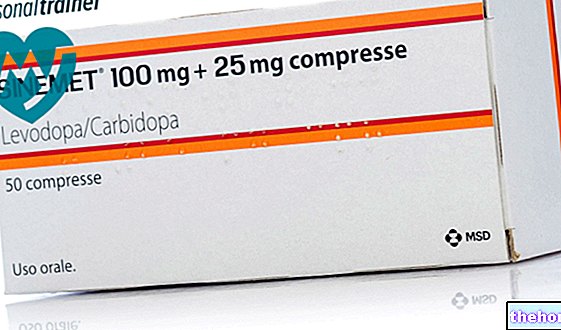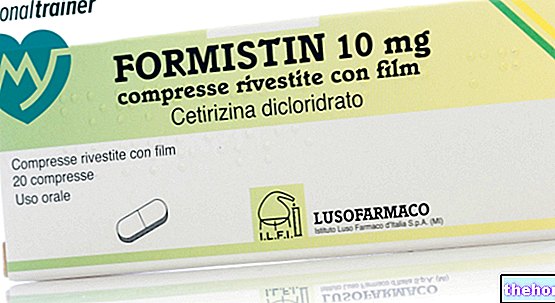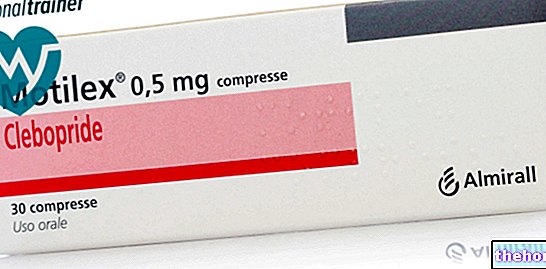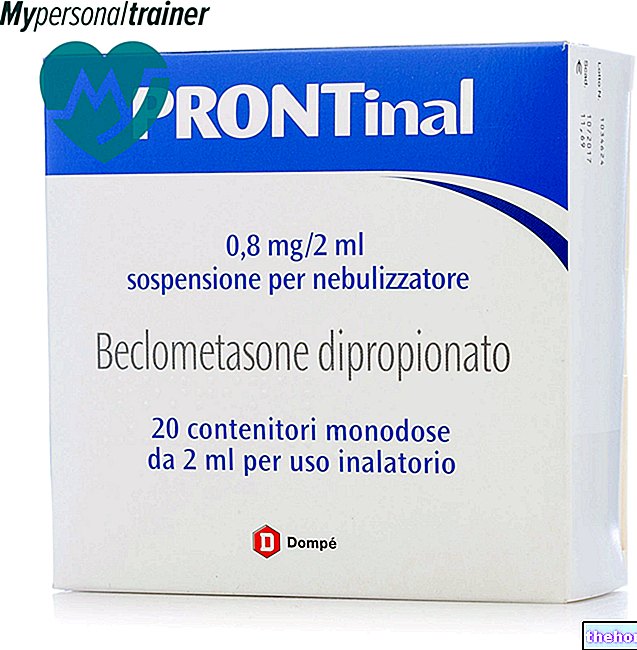Active ingredients: prednisone
DELTACORTENE 5 mg tablets DELTACORTENE 25 mg tablets
Why is Deltacortene used? What is it for?
DELTACORTENE is a tablet medicine that contains the active substance prednisone, a synthetic hormone that belongs to the group of corticosteroids.
Corticosteroids are hormones produced by the adrenal glands that possess anti-inflammatory activity. Anti-inflammatory drugs reduce pain, swelling, stiffness, redness and heat in the affected tissues.
For these properties DELTACORTENE is used:
- in addition to other medicines, in the treatment of rheumatic diseases (e.g. rheumatoid arthritis, Still's disease, ankylosing spondylitis, acute gouty arthritis)
- as a therapy for severe and / or widespread inflammation, for example in special cases of systemic lupus erythematosus (chronic disease due to an "alteration of the immune system that causes inflammation and tissue damage), dermatomyositis (chronic inflammatory disease of the muscles), inflammations that affect structures adjacent to the joints (e.g. bursae, tendons, connective tissue), cardiac inflammation of rheumatic origin
- in case of severe or debilitating allergies, such as bronchial asthma, contact dermatitis, atopic dermatitis, which do not respond or respond insufficiently to other therapies,
- to treat sarcoidosis (inflammatory disease that can affect several organs, but mainly the lungs and lymph nodes)
- to treat certain blood disorders (e.g. some forms of anemia)
- as palliative treatment of certain malignant proliferations (tumors) of white blood cells (leukemia) or of certain organs (e.g. tumors of the lymph nodes)
- in addition to other medicines, to treat some diseases of the gastrointestinal tract (e.g. ulcerative colitis).
Contraindications When Deltacortene should not be used
Do not take DELTACORTENE
- if you are allergic to prednisone or any of the other ingredients of this medicine
- if you suffer from:
- tuberculosis (TB), a "bacterial infection that usually affects the lungs;
- stomach or intestinal ulcers;
- mental disorders;
- viral infections (e.g. herpes simplex eye disease);
- generalized fungal infections;
- severe weakening of the bones (severe osteoporosis);
- if your immune system is impaired;
- if you have a high level of sugar (glucose) in your blood and cannot control it (unstable diabetes)
Precautions for use What you need to know before taking Deltacortene
Talk to your doctor or pharmacist before taking DELTACORTENE.
You should tell your doctor if you have (at present) or have had (in the past) any of the following conditions, or if you have had any of the following treatments:
- intestinal diseases such as colitis and diverticula;
- surgery on the intestine;
- wounds in the stomach wall (active peptic ulcer);
- kidney diseases;
- high blood pressure;
- severe muscle weakness;
- weakening of the bones (mild or moderate osteoporosis);
- tooth infections or abscesses;
- psychological or emotional disorders;
- too high level of sugar (glucose) in the blood (diabetes). Your doctor might
- increase the dose of diabetes medications and closely monitor blood sugar levels
Other important information on DELTACORTENE
DELTACORTENE can have an effect on the immune system. This impairs its ability to fight infections. If your immune system is impaired:
- vaccinations may not be effective during treatment with DELTACORTENE;
- there may be an increased risk of serious infections. Treatment with DELTACORTENE may increase the likelihood of developing an "infection. If you are developing an" infection, it may be more difficult to detect it during treatment with DELTACORTENE.
Treatment with DELTACORTENE can have a negative effect on the way calcium is metabolized in your bones. For this reason, you should clarify the risk of osteoporosis (bone loss and fractures) with your doctor, particularly if you have family members with a history of bone fractures, if you do not exercise regularly, if you are a woman in or postmenopausal or elderly.
It may be necessary to reduce the dose of DELTACORTENE in case of:
- hypothyroidism (underactive thyroid gland)
- cirrhosis of the liver (liver disease caused by alcoholism or hepatitis)
- adrenal insufficiency. This occurs when the adrenal gland does not produce enough cortisol (a hormone) that is particularly likely in stressful situations, such as with ongoing infections, after an accident, or if you are undergoing increased physical fatigue.
The dose of DELTACORTENE may need to be adjusted in case of stressful events, such as surgery or an "infection".
If you take DELTACORTENE for several months or more, your doctor will carry out periodic checks, such as: eye test, blood test, blood pressure check.
Children
In very early childhood, the drug should be administered in cases of real need, under the direct supervision of the doctor. Children undergoing prolonged therapy must be closely monitored from the point of view of growth and development.
For those who carry out sporting activities
the use of the drug without therapeutic necessity constitutes doping and can in any case determine positive anti-doping tests.
YOUR DOCTOR WILL ADVISE YOU WHAT TO DO.
Interactions Which drugs or foods can modify the effect of Deltacortene
Tell your doctor or pharmacist if you are taking, have recently taken or might take any other medicines.
Treatment with DELTACORTENE may reduce the effects of the following medicines:
- medicines for diabetes, eg. oral antidiabetics such as sulfonylureas.
- medicines containing salicylate.
The following medicines may reduce the effect of DELTACORTENE:
- phenobarbital, primidone, carbamazepine, phenytoin, used to treat epilepsy;
- antibiotics such as rifampicin, used to treat infections
- brocodilators such as ephedrine, used to treat asthma;
The following medicines may increase the effect of DELTACORTENE:
- diltiazem, used to treat heart disease;
- antibiotics (Macrolides) such as erythromycin, troleandomycin, used to treat infections;
- estrogen, the main female sex hormones.
Other effects of DELTACORTENE:
- increases the risk of gastrointestinal bleeding associated with the use of non-steroidal anti-inflammatory drugs (NSAIDs), such as acetylsalicylic acid, diclofenac and ibuprofen,
- increases or decreases, depending on the subject, the blood-thinning effects of anticoagulant drugs; in particular, DELTACORTENE increases the anticoagulant effect of warfarin
If you are taking any of the medicines listed above, your doctor may prescribe another medicine or adjust the dose of DELTACORTENE or the other medicine.
YOUR DOCTOR WILL ADVISE YOU WHAT TO DO.
Warnings It is important to know that:
Pregnancy and breastfeeding
If you are pregnant or breast-feeding, think you may be pregnant or are planning to have a baby, ask your doctor or pharmacist for advice before using this medicine.
Driving and using machines
DELTACORTENE is unlikely to affect the ability to drive or use machines. However, if you experience undesirable effects such as visual disturbances or changes in mental status, it is advisable to avoid carrying out these activities.
DELTACORTENE contains lactose
The medicine contains a sugar called lactose.If you have been diagnosed with "intolerance to some sugars, consult your doctor before taking DELTACORTENE.
Dose, Method and Time of Administration How to use Deltacortene: Posology
Always take this medicine exactly as your doctor or pharmacist has told you. If in doubt, consult your doctor or pharmacist.
The dose of DELTACORTENE prescribed by your doctor depends on the severity of the disease. Usually the maintenance dose should not exceed 10-15 mg of prednisone per day.
The starting dose may be higher and, on the advice of the doctor, subsequently gradually reduced to the maintenance dose based on:
- to the symptoms of the disease;
- to the response to DELTACORTENE
Method of administration:
DELTACORTENE is taken orally. Take the number of tablets prescribed by your doctor. Your doctor will discuss with you how long the treatment will take.
Overdose What to do if you have taken too much Deltacortene
If you take more DELTACORTENE than you should:
an increase in side effects on electrolyte balance (salts), which can lead to an increased risk of abnormal heart beat, and on the metabolism of some minerals such as calcium, which can lead to an increased risk of fractures, is likely.
CONTACT A DOCTOR IF YOU ARE WORRIED OR IF YOU NOTICE AN INCREASE IN SIDE EFFECTS
If you forget to take DELTACORTENE
CONTACT YOUR DOCTOR TO KNOW HOW TO BEHAVE
If you stop taking DELTACORTENE
Do not suddenly stop taking DELTACORTENE. If you stop taking DELTACORTENE:
- the symptoms of your disease may reappear
- cortisone withdrawal syndrome (a serious illness) may occur
caused by the body's lack of cortisol production).
IF YOU HAVE ANY DOUBTS ABOUT THE USE OF THIS MEDICINAL PRODUCT, PLEASE ASK YOUR DOCTOR OR PHARMACIST
Side Effects What are the side effects of Deltacortene
Like all medicines, this medicine can cause side effects, although not everybody gets them.
The frequency and severity of the side effects listed below depends on the dosage and duration of treatment.
Very common: More than 1 in 10 people taking DELTACORTENE
Common: less than 1 in 10 but more than 1 in 100 people taking DELTACORTENE
Uncommon: less than 1 in 100 people but more than 1 in 1000 people taking DELTACORTENE
Rare: less than 1 in 1,000 people but more than 1 in 10,000 people taking DELTACORTENE
Very rare: less than 1 in 10,000 people take DELTACORTENE
Very common side effects of DELTACORTENE:
Ulcers of the oral cavity (canker sores).
Burning sensation and stomach pain.
Nausea, Vomiting, Diarrhea.
Abdominal swelling with cramps and pain.
General malaise, weakness, fever.
Hives, itching, wheals.
Skin redness, Acne, skin striae
Headache, Dizziness.
Throat irritation, Cough.
Infections from various causes, reduced ability to fight them. Infections may be more severe or symptoms may be masked.
Common side effects of DELTACORTENE:
Increase or decrease in the number of blood cells.
Increased values of liver enzymes (Transaminase), bilirubin, digestive enzymes (Amylase, Lipase), blood glucose, blood fluidity monitoring test (INR) values.
Abscesses.
Cardiac pathology and heart rhythm disturbances.
Difficult digestion, inflammation of the stomach and intestines, burning in the esophagus.
Swelling of the mucous membranes and face. Burning in the eyes. Contact dermatitis.
Accumulation of fluid (edema).
Muscle deterioration and weakness, bone deterioration leading to an increased risk of bone fractures (osteopenia and osteoporosis).
Somnolence, dizziness, transient paralysis of the limbs and in particular of the hand.
Agitation, Irascibility, Confusion, Difficulty sleeping.
Bronchopneumonia, Pneumonia.
Capillary fragility, Bruises.
Uncommon side effects of DELTACORTENE:
Failure to produce blood cells.
Disorders of the secretion of sex hormones, which can cause irregular menstruation in women or impotence in men.
Diabetes.
Increased hair growth.
Lens opacity (cataract) and increased eye pressure (glaucoma) with or without eye pain. Double vision, decreased vision.
Dryness, inflammation of the mouth, tingling of the tongue.
Constipation.
Gastric and duodenal ulcer, bleeding from the intestine, blood in the stool.
High fever, septicemias.
Gallbladder problems.
Achilles tendon injury and / or rupture.
Disturbances in the balance of sugars, fats and salts in the body, which can cause an increase in appetite and body weight.
Loss of appetite.
Child growth retardation.
Development or aggravation of seizures.
Delayed healing of wounds and dry skin.
Fainting due to decreased blood pressure.
Tremors.
Depression (feeling of sadness), anxiety, irritability, feelings of happiness not justified by reality, increased impulsiveness, loss of contact with reality (psychosis), memory disturbance, panic attack
Water retention.
Increase in the amount of urine, blood in the urine.
Breathing difficulty.
Increased blood pressure.
Cell death phenomena
Thickening or inflammation of the lining of blood vessels and blood clots.
Herpes
Rare side effects of DELTACORTENE:
Hormonal imbalance causing Cushing's syndrome (typical symptoms: round face, often called "full moon face", weight gain in the upper body)
Blindness in one eye, swelling around the eyes.
Blood from the mouth, ulcers in the esophagus.
Tooth loss, brittle teeth. Hiccup.
Diverticulitis. Bowel obstruction.
Severe and rapid swelling (edema) of the skin, mucous membranes and submucosal tissues.
Severe and simultaneous alteration of the function of several organs (multi-organ failure). Reversible changes in cerebral perfusion (reversible posterior leukoencephalopathy).
Severe liver problems.
Viral related tumors (Kaposi's sarcoma).
Reactivation of viral pathologies.
Hallucinations, attempted suicide.
Diffuse pain due to inflammation of the peripheral sensory nerves.
Severe kidney problems
Very rare side effects of DELTACORTENE:
Overactive thyroid gland (hyperthyroidism) which can cause periodic episodes of paralysis.
Expiry and Retention
Keep this medicine out of the sight and reach of children
Do not use this medicine after the expiry date which is stated on the carton. The expiry date refers to the last day of the month.
Do not store above 25 ° C
Do not throw any medicines via wastewater or household waste. Ask your pharmacist how to throw away medicines you no longer use. This will help protect the environment.
Source Package Leaflet: AIFA (Italian Medicines Agency). Content published in January 2016. The information present may not be up-to-date.
To have access to the most up-to-date version, it is advisable to access the AIFA (Italian Medicines Agency) website. Disclaimer and useful information.
01.0 NAME OF THE MEDICINAL PRODUCT
DELTACORTENE
02.0 QUALITATIVE AND QUANTITATIVE COMPOSITION
DELTACORTENE 5 mg tablets
One tablet contains:
Active ingredient: prednisone 5 mg.
Excipients with known effects: lactose
DELTACORTENE 25 mg tablets
One tablet contains:
Active ingredient: prednisone 25 mg.
Excipients with known effects: lactose
For the full list of excipients, see section 6.1
03.0 PHARMACEUTICAL FORM
Tablets.
04.0 CLINICAL INFORMATION
04.1 Therapeutic indications
Conditions of rheumatological interest as adjunct therapy for short-term administration (to help the patient overcome an acute episode or exacerbation) in: rheumatoid arthritis (special cases may require low-dose maintenance therapy), Still's disease, ankylosing spondylitis , acute gouty arthritis.
Collagen diseases: during an exacerbation or as maintenance therapy in particular cases of systemic lupus erythematosus, dermatomyositis, periarthritis, acute rheumatic carditis. To control severe or debilitating allergic conditions that cannot be treated conventionally: bronchial asthma, contact dermatitis, atopic dermatitis. Sarcoidosis.
Haematological affections: acquired haemolytic anemia (autoimmune), for the palliative treatment of leukemias and lymphomas in adults, acute childhood leukemia.
As an adjunct in the treatment of ulcerative colitis.
04.2 Posology and method of administration
DELTACORTENE is administered for os: the therapeutic dose of attack in the average weight adult corresponds to 20-30 mg per day. This initial dose is rapidly reduced in the space of a week to a maintenance dose that oscillates on average around 10 mg per day: smaller doses may also be required in relation to the patient's body weight and age. maintenance will in any case be fixed by the attending physician who, if he incurs an inadequate dose, will assist in the recovery of the disorders.
For the administration of high doses in particular haematological, dermatological forms, etc. you can use tablets with a unit dosage higher than 25 mg.
IT IS IMPORTANT TO EMPHASIZE THAT THE CORTICOSTEROID NEEDS IS VARIABLE AND THEREFORE THE DOSAGE MUST BE INDIVIDUALIZED TAKING INTO ACCOUNT THE DISEASE AND THE THERAPEUTIC RESPONSE OF THE PATIENT.
04.3 Contraindications
Hypersensitivity to the active substance or to any of the excipients listed in section 6.1.
The use of DELTACORTENE is contraindicated in case of tuberculosis, peptic ulcer, psychosis, ocular herpes simplex, systemic fungal infections. Generally contraindicated during pregnancy and lactation (see Section 4.6).
As with other glucocorticoids, the use of prednisone is contraindicated in cases of severe osteoporosis, immunodeficiency states, unstable diabetes (see Section 4.4).
04.4 Special warnings and appropriate precautions for use
In patients on corticosteroid therapy subjected to particular stress it is essential to adjust the dose in relation to the extent of the stressful condition.
Corticosteroids can mask some signs of infection, and intercurrent infections can occur during their use.
In these cases, the opportunity to institute adequate antibiotic therapy should always be evaluated. A state of secondary adrenal insufficiency, induced by the cortisone, can be contained with a gradual reduction of doses. This type of relative insufficiency can persist for months after the suspension of the drug. Therefore, in any stressful situation, which occurs during this period, adequate hormonal therapy should be instituted. In hypothyroid patients or patients with liver cirrhosis the response to corticosteroids may be increased.
Psychic alterations of various kinds may occur during corticotherapy: euphoria, insomnia, changes in mood or personality, severe depression or symptoms of real psychosis. Pre-existing emotional instability or psychotic tendencies can be aggravated by corticosteroids (see section 4.3). .
The use of DELTACORTENE in active tuberculosis should be limited to cases of fulminant or disseminated disease, in which the corticosteroid should be used with appropriate antituberculous therapy.
If corticosteroids are administered to patients with latent tuberculosis or a positive response to tuberculin, close surveillance is required as disease activation may occur.
In prolonged corticotherapy these patients must receive "adequate chemoprophylaxis.
The maintenance posology must always be the minimum capable of controlling the symptoms; a dosage reduction must always be done gradually.
Corticosteroids should be administered with caution in the following cases: non-specific ulcerative colitis with danger of perforation, abscesses and pyogenic infections in general, diverticulitis, recent intestinal anastomosis, renal insufficiency, severe hypertension, stable diabetes, moderate osteoporosis, myasthenia gravis.
Warfarin: During concomitant therapy with prednisone, any changes in INR occur in 3-10 days, therefore monitoring of INR after initiation of therapy is useful (see Section 4.5).
Diltiazem: Caution should be exercised during concomitant chronic therapy with diltiazem due to the slowing of the metabolism of prednisone (see Section 4.5).
Prednisone decreases the antibody response to vaccines increasing the risk of adverse events.
Patients should not be vaccinated against smallpox or other live attenuated vaccines during corticosteroid treatment. Other immunizing procedures should not be undertaken in patients receiving corticosteroids especially at high doses, due to increased risk of neurological complications and decreased antibody response.
Corticosteroids reduce the hypoglycemic effect of antidiabetic agents (sulfonylureas), therefore caution should be exercised in glycemic control (see Section 4.5).
Macrolides: Particular caution is recommended in concomitant therapy as interaction with macrolides may result in increased glucocorticoid concentrations (see Section 4.5).
During glucocorticoid therapy, serum levels of Vitamin D metabolites are usually normal, while those of PTH are often elevated, reflecting a state of secondary hyperparathyroid hypocalcemia.
Caution should be exercised during prednisone therapy in relation to the potential effects on the central nervous system (see Sections 4.7 and 4.8).
Pediatric population:
In very early childhood, the product should be administered in cases of real need, under the direct supervision of the doctor.
Children undergoing prolonged corticotherapy must be closely monitored from the point of view of growth and development.
Warfarin administration should be practiced with caution in children receiving concomitant corticosteroid therapy (see Section 4.5).
For those who carry out sporting activities: the use of the drug without therapeutic necessity constitutes doping and can in any case determine positive anti-doping tests.
Important information about some of the ingredients
The medicine contains lactose; it is therefore not suitable for patients with rare hereditary problems of galactose intolerance, lactase deficiency, or glucose-galactose malabsorption.
04.5 Interactions with other medicinal products and other forms of interaction
Associations to be taken into consideration
Antiepileptic drugs: barbiturates (phenobarbital, primidone, carbamazepine, phenytoin), reduce the efficacy of systemic steroids, so much so that an increase in the dose of steroids is necessary.
Diltiazem: Potentiation of the side effects of prednisone by diltiazem has been shown during chronic concomitant therapy (see Section 4.4).
Anticoagulant drugs: Corticosteroids can both increase and decrease the anticoagulant action; it is therefore necessary to strictly control those who take both oral anticoagulants and corticosteroids. In particular, the concomitant use of prednisone during the administration of Warfarin results in an enhancement of the anticoagulant effect resulting in an elevation of the INR (see Section 4.4).
Antidiabetics (sulfonylureas): corticosteroids reduce the hypoglycemic effect of antidiabetic agents (see section 4.4).
Macrolides: the concomitant use of corticosteroids during antibiotic therapy with macrolides (erythromycin, troleandomycin), may lead to an increase in the concentration of steroids; it is therefore recommended to reduce the dose of the glucocorticoid (see section 4.4).
Non-steroidal anti-inflammatory agents (NSAIDs): corticosteroids may increase the incidence and / or severity of gastrointestinal bleeding and ulceration caused by NSAIDs. Corticosteroids can reduce serum salicylate levels resulting in decreased efficacy.
During simultaneous treatment with some antibiotics (rifampicin) and bronchodilators (ephedrine) it is suggested to increase the maintenance dose of the glucocorticoid; on the contrary, in the course of simultaneous treatment with estrogen or preparations containing estrogen, it is recommended to reduce the dose of glucocorticoid.
In patients with hypoprothrombinemia, caution is advised in combining acetylsalicylic acid with corticosteroids.
Patients on corticosteroid therapy should not be vaccinated against smallpox or other live attenuated vaccines. Other immunizing procedures should not be undertaken in patients receiving corticosteroids especially at high doses, due to increased risk of neurological complications and decreased antibody response.
04.6 Pregnancy and lactation
In women who are pregnant, lactating and in very early childhood, the product should be administered in cases of real need, under direct medical supervision.
04.7 Effects on ability to drive and use machines
Although there is no known interference with the ability to drive or use machines during prednisone therapy, the use of corticosteroids has been associated with psychotic, cognitive and mood disorders (see sections 4.4 and 4.8).
04.8 Undesirable effects
During cortisone therapy, some of the following undesirable effects may occur as evidenced by post-marketing experience. The frequency and severity of the undesirable effects listed below depend on the dosage and duration of treatment.
[Very common (≥1 / 10); common (≥1 / 100,
04.9 Overdose
During prolonged therapy and with high doses, should an alteration of the electrolyte balance occur, it is advisable to adjust the sodium and potassium intake. Corticosteroids increase urinary excretion of calcium and inhibit its absorption from the gut (see Section 4.4).
In case of overdose it is recommended to carry out, in concomitance with the usual measures for the elimination of the unabsorbed drug (gastric lavage, charcoal, etc.), clinical monitoring of the patient's vital functions.
05.0 PHARMACOLOGICAL PROPERTIES
05.1 Pharmacodynamic properties
Pharmacotherapeutic group: systemic, non-associated corticosteroids - glucocorticoids.
ATC code: H02AB07.
Prednisone, while presenting the typical profile of the glucocorticoid steroid, differs from cortisone, from which it derives by dehydrogenation in position 1, 2 of the molecule, for the ability to increase (on average 4 times compared to cortisone) all those related pharmacological activities with the antireactional properties of this class of compounds. Prednisone does not possess a biological activity in itself, but becomes active in the organism as it undergoes, by the hepatic reductases which reduce the ketone in position 11 to hydroxyl, a rapid conversion to prednisolone which represents the activated metabolite of the steroid. Under normal conditions, this process occurs rapidly and completely in the liver, so much so that prednisone and prednisolone can be considered pharmacologically equivalent.
The studies conducted in different experimental models, in addition to demonstrating the remarkable anti-inflammatory activity of the cortisone, have indicated that prednisone is able to influence glyconeogenesis, to stimulate the deposition of hepatic glycogen, to determine an eosinopenizing effect, to prolong the time of survival in adrenalectomized animals, to protect rats from acute egg white poisoning, to inhibit weight growth and to antagonize the alterations experimentally induced in the endothelium of veins and capillaries. The experiments conducted, finally, on hydro excretion -mineral, have shown that the administration of therapeutic doses of prednisone causes an advantageous increase in diuresis and sodium elimination, without stimulating the urinary excretion of potassium. As in the case of other glucocorticoids, the effects of prednisone on sodium excretion are the result of the variations that the steroid induces on the balance between the rate of increase in renal glomerular filtration and the increase in tubular reabsorption of this ion.
05.2 Pharmacokinetic properties
Prednisone is rapidly absorbed in humans from the intestine, reaching the mean peak blood concentrations 0.5-1 hour after oral administration of 20 mg of the product. Corticosteroid binds to plasma proteins in a very high percentage (60 - 90%) and the oral bioavailability is calculated around 0.85% of the administered dose. The distribution rate has been estimated at 0.85 L / kg, the total and free plasma half-life at 2.58 and 1.89, respectively. hours and the biological half-life in 18-36 hours. Under the latter profile, prednisone has a longer half-life than that of cortisone and hydrocortisone and, therefore, is more effective than natural glucocorticoids with longer lasting anti-inflammatory effects. Finally, clearance total is 0.232 L h-1kg-1, while urinary elimination is estimated at 13.7% of the administered dose. The metabolism of prednisone is similar to that of its natural relatives cortisone and hydrocortisone and is common to the general metabolism of glucocorticoids. It begins with the hydrogenation of the first aromatic ring with the formation of tetrahydro-derivatives, it proceeds with the reduction of the ketone group in position 3, to achieve the formation of the 17-ketosteroids 11-hydroxylates which constitute the fundamental stage of the metabolism of glucocorticoids. they can already be eliminated directly, but to a small extent with the urine, while they are excreted in greater quantities and more easily, because they are more soluble, in conjugated form.
05.3 Preclinical safety data
Single dose toxicity tests performed with prednisone demonstrated low oral and parenteral steroid toxicity. No toxic manifestations were observed with prednisone in rats treated orally at doses up to 2 g / kg and subcutaneously at doses of 500 mg / kg. Changes observed in repeated oral administration tests in the rat (30 mg / kg / day for 8 weeks plus 120 mg / kg / day for an additional 3 weeks) and in the monkey rhesus (duration of 56 days and 13 weeks with doses up to 20 mg / kg) are due to the well-known effects found in the animal after treatment with glucocorticoids. As is known, these effects (mainly characterized by alterations in the blood count, atrophy lymphoid tissues, adrenal atrophy) are related not only to the chemical structure of each steroid but also to the dosages used which lead to an exaggeration of the glucocorticoid pharmacological response. Also the results of fetal toxicity tests conducted during the period of organogenesis in the mouse subcutaneously (doses from 3.3 to 13 mg / kg), in the rat by the oral route (from 1 to 60 mg / kg) and in the rabbit by the oral route (from 1 to 30 mg / kg) and intramuscularly (0.625 mg / kg) made it possible to detect that the alterations induced to the product of conception are comparable to those usually observed with other glucocorticoids, under the same experimental conditions. , the results of the carcinogenicity tests conducted in mice and rats, the data obtained (increase in the incidence of spontaneous tumors in a single animal species, rat, and in one sex only, females) were not considered probative due to the deficiencies the experimental design and the evaluation of the data with reference to the survival times of the animals, the high incidence of spontaneous tumors at the beginning of the tests, the amalgamation of the experimental groups and types of tumors.
06.0 PHARMACEUTICAL INFORMATION
06.1 Excipients
DELTACORTENE 5 mg tablets
Stearic acid; cornstarch; microcrystalline cellulose; lactose.
DELTACORTENE 25 mg tablets
Magnesium stearate; cornstarch; microcrystalline cellulose; lactose.
06.2 Incompatibility
Not relevant.
06.3 Period of validity
In intact packaging 5 years.
06.4 Special precautions for storage
This medicine does not require any special storage conditions.
06.5 Nature of the immediate packaging and contents of the package
- Box of 10 tablets of 5 mg in blister
- Box of 20 tablets of 5 mg in blister
- Box of 10 tablets of 25 mg in blister
06.6 Instructions for use and handling
No special instructions.
07.0 MARKETING AUTHORIZATION HOLDER
BRUNO FARMACEUTICI S.p.A. - Via delle Ande, 15 - 00144 ROME
08.0 MARKETING AUTHORIZATION NUMBER
10 tablets of 5 mg: A.I.C. n. 010089011
20 tablets of 5 mg: A.I.C. n. 010089047
10 tablets of 25 mg: A.I.C. n. 010089035
09.0 DATE OF FIRST AUTHORIZATION OR RENEWAL OF THE AUTHORIZATION
June 2010
10.0 DATE OF REVISION OF THE TEXT
AIFA determination of 10 June 2013.




























